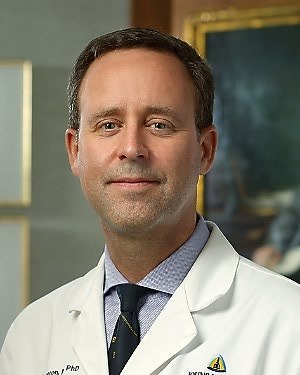The DELTA Center for Alcohol Research
Funded by the National Institutes of Health (NIH), this unique program focuses on delivery of early liver transplant for severe alcoholic hepatitis, potentially qualifying patients for transplant sooner than the six month waiting period often required at other centers.
Severe Alcoholic Hepatitis and Early Liver Transplant | FAQ with Dr. Andrew Cameron
Transplant surgeon Andrew Cameron answers frequently asked questions about treatment options for severe alcoholic hepatitis, including the possibility of liver transplant.
Alcoholic Hepatitis: What You Need to Know
-
While it is true that heavy drinking over a long time period can cause alcoholic hepatitis, not all people who drink heavily will develop alcoholic hepatitis. Conversely, even “social drinkers” with a history of moderate — not necessarily heavy — alcohol consumption can develop alcoholic hepatitis. Further study is needed to better understand what causes the liver to react differently to alcohol in some than others.
-
Alcoholic hepatitis most often occurs in people between the ages of 30–40. In some cases, individuals may not realize their level of alcohol consumption is harming their liver. Alcohol affects the liver differently for different people due to a number of factors, all of which are not yet known or understood. Johns Hopkins is actively researching these factors through the DELTA Center.
-
Most transplant centers require a six-month period of abstinence from drinking alcohol before allowing a patient with alcohol use to undergo a liver transplant. However, Johns Hopkins has begun offering early liver transplant for alcoholic hepatitis and now doesn’t necessarily require this waiting period, rather each patient is considered on a case-by-case basis.
-
There is not firm scientific evidence to show that a six-month alcohol-free period will predict whether a person will drink again after a liver transplant. In fact, Johns Hopkins has offered early liver transplant for alcoholic hepatitis — transplant without a six-month waiting period — for several years and has found that these patients had the same likelihood of drinking again as those who had waited at least six months to get their transplants.
-
By the time severe alcoholic hepatitis is diagnosed, irreversible damage has often been done to the liver. At this point, the only cures are abstinence and maybe liver transplantation. At the time of diagnosis, some patients are quite ill and need a liver transplant to survive before a six-month waiting period has elapsed
-
The Johns Hopkins DELTA Center focuses on treating patients beyond their liver transplant — our experts concentrate on both physical recovery from transplantation surgery as well as overall well-being. DELTA Center patients are given access to critical mental health support services and substance abuse treatment through the Johns Hopkins Department of Psychiatry after their transplants.








